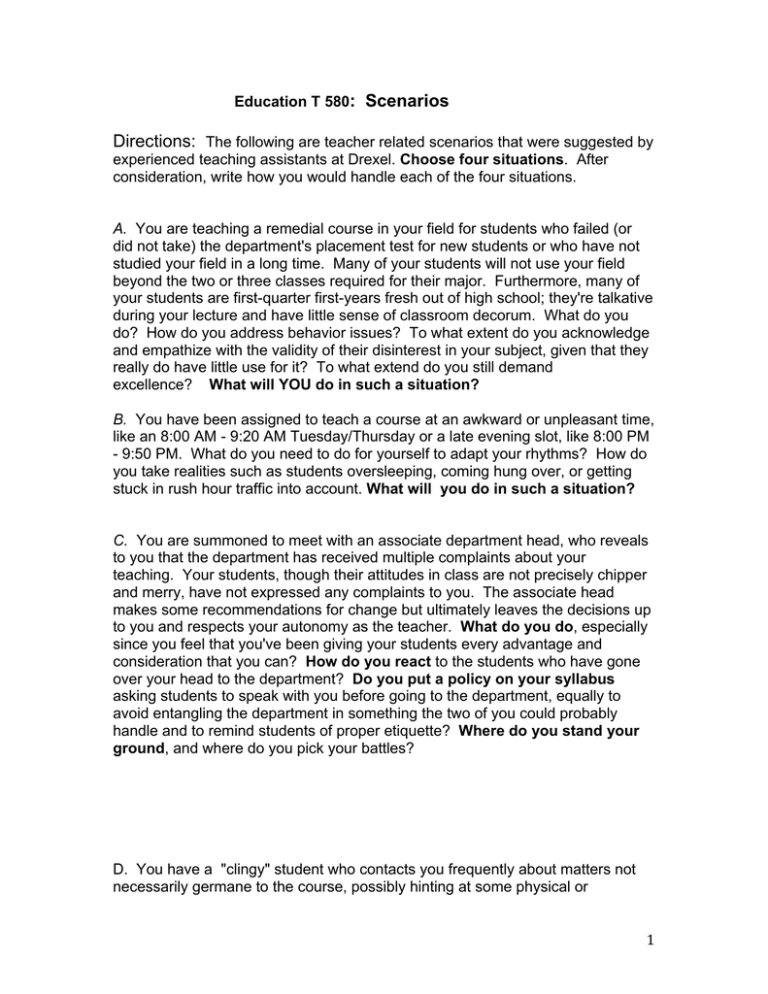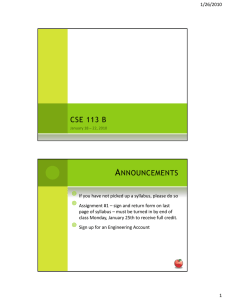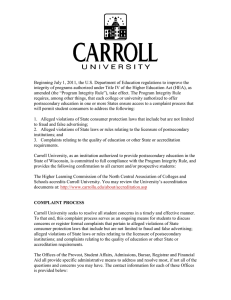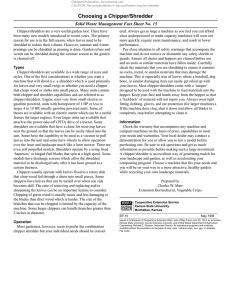: Scenarios Directions:
advertisement

Education T 580: Scenarios Directions: The following are teacher related scenarios that were suggested by experienced teaching assistants at Drexel. Choose four situations. After consideration, write how you would handle each of the four situations. A. You are teaching a remedial course in your field for students who failed (or did not take) the department's placement test for new students or who have not studied your field in a long time. Many of your students will not use your field beyond the two or three classes required for their major. Furthermore, many of your students are first-quarter first-years fresh out of high school; they're talkative during your lecture and have little sense of classroom decorum. What do you do? How do you address behavior issues? To what extent do you acknowledge and empathize with the validity of their disinterest in your subject, given that they really do have little use for it? To what extend do you still demand excellence? What will YOU do in such a situation? B. You have been assigned to teach a course at an awkward or unpleasant time, like an 8:00 AM - 9:20 AM Tuesday/Thursday or a late evening slot, like 8:00 PM - 9:50 PM. What do you need to do for yourself to adapt your rhythms? How do you take realities such as students oversleeping, coming hung over, or getting stuck in rush hour traffic into account. What will you do in such a situation? C. You are summoned to meet with an associate department head, who reveals to you that the department has received multiple complaints about your teaching. Your students, though their attitudes in class are not precisely chipper and merry, have not expressed any complaints to you. The associate head makes some recommendations for change but ultimately leaves the decisions up to you and respects your autonomy as the teacher. What do you do, especially since you feel that you've been giving your students every advantage and consideration that you can? How do you react to the students who have gone over your head to the department? Do you put a policy on your syllabus asking students to speak with you before going to the department, equally to avoid entangling the department in something the two of you could probably handle and to remind students of proper etiquette? Where do you stand your ground, and where do you pick your battles? D. You have a "clingy" student who contacts you frequently about matters not necessarily germane to the course, possibly hinting at some physical or 1 emotional attraction that is inappropriate given your current TA-student relationship. What will you do? E. A student with emerging psychological problems is having trouble functioning in your course (or, indeed, in the University atmosphere) and is coming to you looking for help with managing the course, but possibly also for life advice. What will you do? F. You have "nontraditional" students --- students who are working during the day on co-op and taking your night class; "adult" students (say, over 30) who may have full time jobs, spouses, and children. While this last category is often, in my experience, the most focused and dedicated of all my students, they sometimes have conflicts and excuses that would never occur with your typical 18-22 year-old student. What, if any, exceptions do you make for these students? What, for you, is the dividing line between erring on the side of compassion and following justly and fairly the syllabus? G. One situation that I found particularly challenging in TAing my first semester was juggling super busy office hours. I had one student get very (very!) upset that I helped another student who walked directly up to me and asked a question before addressing her questions, as she had asked for me to help her after I was finished with the student I was working with prior. The student got confrontational with her words. How would you handle a situation where office hours are overcrowded? H. You are proctoring a test and you notice that a student is cheating. What will you do? I. You see student checking their phones instead of paying attention to your lecture/ explanation, solution to a problem, etc. What will you do? H. A student comes to you unhappy with this grade and wants extra credit. What will you do? I. You are not very sure how your professor wants you to grade his students’ tests and homework assignments . What will you do? - 2 J. You have a student who is constantly late to class . What will you do? K. You have a few students in your class who challenge your authority. What will you do? L . The lead professor is inconsistent in grading policy. What will you do? M. You have an advisor who is not giving you the guidance you need. You feel that he isn’t really doing his job for your or the students in the class. What will you do? N. A student asks you out for coffee. What will you do? O. You misspoke about material in class and caused confusion. What will you do? P. You have been accused of favoring certain students and discriminating against others. What will you do? Q. Everybody in the class has failed an exam. What will you do? 3











